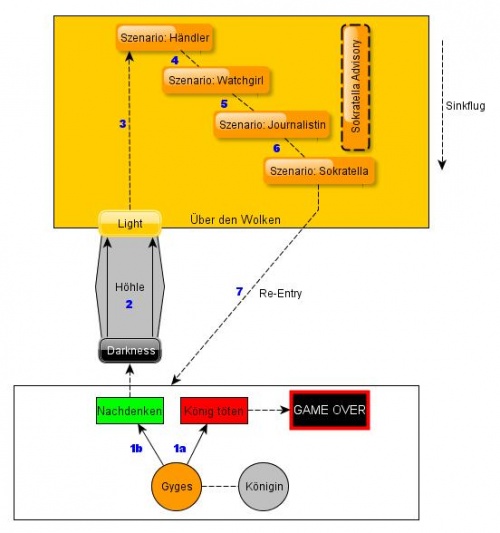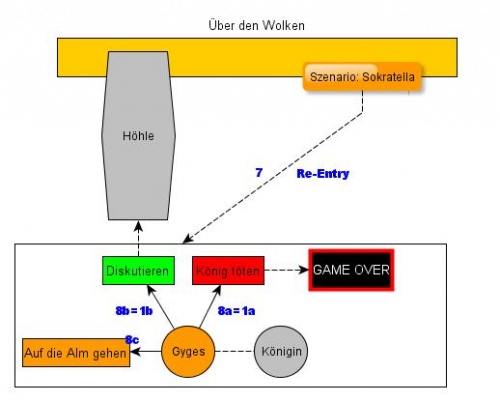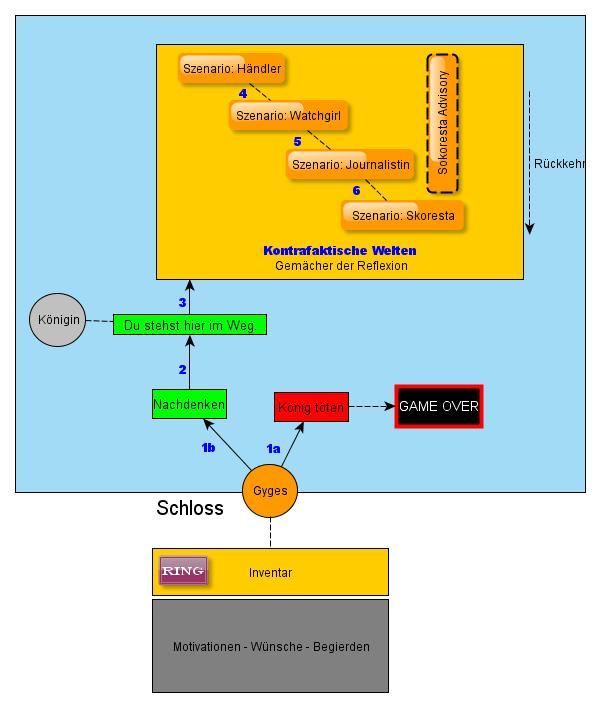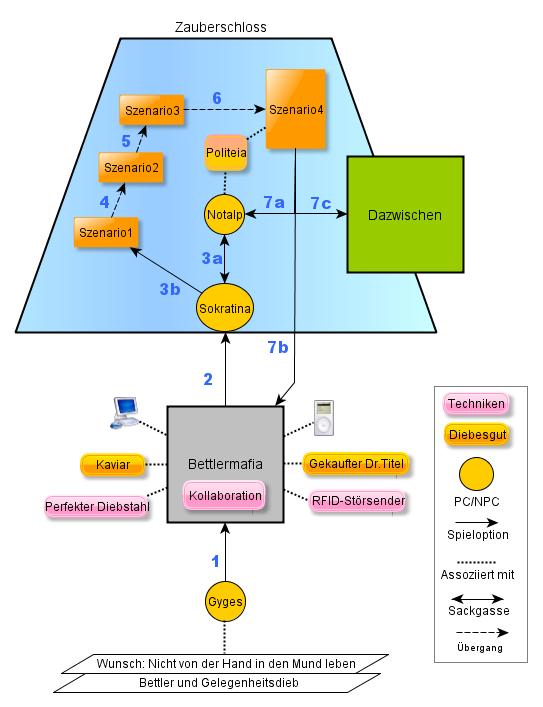Platos Spiel (Präsentation): Unterschied zwischen den Versionen
Sinn (Diskussion | Beiträge) (→Verschiedene Ideen und Ansätze der Gestaltung) |
Sinn (Diskussion | Beiträge) (→Verschiedene Ideen und Ansätze der Gestaltung) |
||
| Zeile 15: | Zeile 15: | ||
[[Datei:Global_Mindset_v2.0.jpg]] | [[Datei:Global_Mindset_v2.0.jpg]] | ||
| + | |||
| + | |||
| + | [[Datei:RahmenplotV3.jpg|Visualisierung: Global Mindset V3.0]] | ||
== Die philosophischen Überlegungen hinter den einzelnen Szenen == | == Die philosophischen Überlegungen hinter den einzelnen Szenen == | ||
Version vom 27. Juni 2009, 13:53 Uhr
Inhaltsverzeichnis
Die Politeia
Ausgewählte Themen für das Spiel
Verschiedene Ideen und Ansätze der Gestaltung
Das Grundkonzept für die Rahmenhandlung wurde in der Sitzung am 3. 4. diskutiert und in der KickOff_Session_(PSI) zusammengefaßt. Es wird eine Reihe von einzelnen Episoden geben, die in einen Zusammenhang gebracht werden. Die Rahmenhandlung ist noch nicht ganz fix, dürfte aber im wesentlichen dem Vorschlag von Andyk folgen: In naher Zukunft hat eine große Gruppe von Emigrantinnen in einem abgeschiedeneren Gebiet eine Reihe von Stadtstaaten nach dem Muster der Politeia errichtet. Das Du ist eine Journalistin von auswärts, die einige davon bereist, um über die inneren Verhältnisse zu berichten.


Die philosophischen Überlegungen hinter den einzelnen Szenen
Die Endfassung: Rekapitulation der Entwicklung
Das Spiel
Hinweise
Was ist Interactive Fiction / IF?
Taken from Wikipedia - Interactive Fiction:
Interactive fiction, often abbreviated IF, describes software simulating environments in which players use text commands to control characters and influence the environment. Works in this form can be understood as literary narratives and as video games. In common usage, the term refers to text adventures, a type of adventure game where the entire interface is text only.
Technische Grundlagen von IF-Spielen
Type simple imperative statements (commands) to tell the program what you want to do.
>look (describe area) >examine lantern >n (go north) >go in >exit >take apple >i (for inventory -- list all the things you are carrying) >put lime in coconut >show flower to Ariel >tell Othello about handkerchief >Juliet, drop the dagger
You will not be allowed to do everything you ask, but the author/programmer has tried to predict what you will try to do. If you are stuck, just ask yourself what you would do if you were really in the situation the text describes.
- Take everything that isn't nailed down.
- Examine things that are mentioned in the room description. (If the computer says it doesn't know an object, you might try a synonym, or you might conclude the object is unimportant.)
- Open, search, or enter objects.
Wie spielt man das Spiel?
There are various ways to play this game. You can play it online or you can download the game and play it on your computer.
Online
You can connect to gehört unser Server dann rein via Telnet and play the game. Another possibility to play, is through Parchment and your Webbrowser. You are able to access the game dann eine richtige URL rein|here
Offline
There is a lot of software, which is able to interpret IF-games. A short list can be found here. All software here is Open Source.
After installing the sofware on your computer please download PlatoState.zcode and open it with your new installed IF-player.
Viel Spaß!
Windows
- Please go to http://ccxvii.net/gargoyle/ and download the latest version of Gargoyle Interactive Fiction Player and follow the installer to install.
Mac OS
- Please go to http://ccxvii.net/spatterlight/ and download the latest version of Spatterlight. Download and open the .dmg file and drop the spatterlight icon to your program-folder in Finder.
Linux
- Please install Frotz on your computer. Frotz can be found pre-compiled on all major Linux-distributions, or you can compile it yourself. Sourcecode can be found here.

